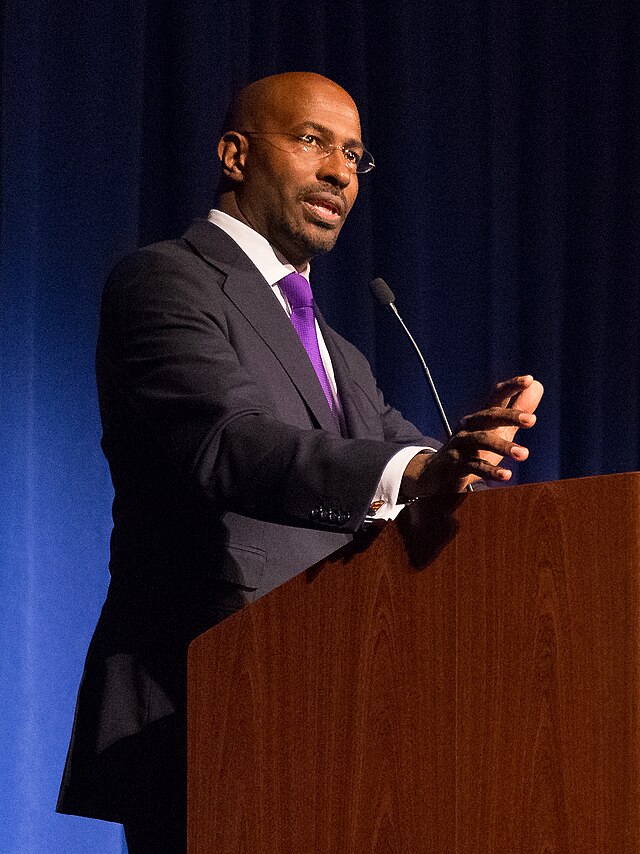Van Jones Reveals Surprising Final Text From Charlie Kirk Just One Day Before His Assassination
CNN political analyst Van Jones revealed this weekend that he received a message from conservative activist Charlie Kirk just a day before Kirk was assassinated during a Utah college event — and the text left him “shocked.”
The disclosure adds a new, human dimension to the tragic story of the Turning Point USA founder’s final hours and underscores Kirk’s stated desire to bridge divides in a time of deep national division.
The Message That Stunned Van Jones
According to Jones, Kirk reached out directly on Sept. 9, writing:
“Hey Van, I mean it, I’d love to have you on my show to have a respectful conversation about crime and race. I would be a gentleman as I know you would be as well. We can disagree about the issues agreeably.”
Jones, who said he and Kirk had been “beefing hard” in the days before the 31-year-old activist’s death, admitted the message caught him off guard.
“Charlie Kirk and I were not friends. At all,” Jones said. “That message shocked me.”
Although he was initially unsure whether to share the private text after Kirk’s assassination, Jones said he ultimately felt it was important to show a different side of his political rival.
A Call for Conversation, Not Censorship
Jones emphasized that the message highlighted Kirk’s interest in debate rather than suppression of opposing views.
“In the past week and a half, just watching people talk about civil wars and censorship and all this stuff coming out of his death, I just thought it was important to let people know — don’t put that on Charlie Kirk,” Jones said.
“The last day of his life, he was reaching out to have not more censorship, [but] more conversation, more dialogue, with somebody who, honestly, was one of his adversaries — me.”
Jones added that he hoped sharing the exchange “might help somebody, on both sides, deal with issues more like he did.”
Tributes and Tensions After Kirk’s Death
Charlie Kirk’s assassination on Sept. 10 during a Utah Valley University event has sent shockwaves through the political world. Supporters have mourned the loss of a rising conservative star, while critics have clashed online about his legacy.
Social media platforms have been flooded with a mix of tributes and, disturbingly, mocking or celebratory posts about his violent death.
The resurfaced text shared by Van Jones offers a stark counterpoint — suggesting Kirk, even in his final hours, sought dialogue across ideological lines.
Funeral and National Attention
Kirk’s funeral is set for Sunday at State Farm Stadium in Phoenix, Arizona, a venue large enough to accommodate the expected thousands of attendees.
Former President Donald Trump will headline the list of speakers, joined by several high-profile conservative figures. Trump is expected to deliver remarks celebrating Kirk’s influence on the movement and his legacy of mobilizing young conservatives.
Charlie Kirk’s Vision of Debate
Supporters of Kirk note that he consistently promoted public debate as a cornerstone of his activism. Through Turning Point USA, he invited ideological opponents onto college campuses for live debates, framing the events as opportunities to challenge mainstream narratives.
The message to Van Jones appears consistent with that vision. Rather than escalate personal conflict, Kirk sought to bring opposing perspectives together — even if only to disagree “agreeably.”
A Rare Point of Agreement
In an era when partisan hostility dominates political discourse, the revelation of Kirk’s outreach to Jones has struck a chord across the spectrum. Some conservatives hailed it as proof of Kirk’s character, while even liberal commentators admitted it highlighted a more nuanced side of his approach.
Jones himself acknowledged the tension between their political differences and the gesture Kirk made in his final hours.
“We were adversaries. But that message showed he wanted a conversation, not a fight,” Jones said.
Looking Ahead
As Turning Point USA moves forward under new leadership and the nation continues to process Kirk’s assassination, the text message shared by Van Jones serves as both a reminder and a challenge: that dialogue, even among adversaries, remains possible.
Kirk’s death left a void in the conservative movement, but his final outreach suggests he hoped his legacy would not be defined solely by division.
With his funeral drawing national attention, the simple message to a rival — “We can disagree about the issues agreeably” — may endure as a poignant part of his story.

James Jenkins is a celebrated Pulitzer Prize-winning author whose work has reshaped the way readers think about social justice and human rights in America. Raised in Atlanta, Georgia, James grew up in a community that instilled in him both resilience and a strong sense of responsibility toward others. After studying political science and creative writing at Howard University, he worked as a journalist covering civil rights issues before dedicating himself fully to fiction. His novels are known for their sharp, empathetic portraits of marginalized communities and for weaving personal stories with broader political realities. Jenkins’s breakout novel, Shadows of Freedom, won national acclaim for its unflinching look at systemic inequality, while his more recent works explore themes of identity, resilience, and the fight for dignity in the face of oppression. Beyond his novels, James is an active public speaker, lecturing at universities and participating in nonprofit initiatives that support literacy and community empowerment. He believes that storytelling is a way to preserve history and inspire change. When not writing, James enjoys jazz music, mentoring young writers, and traveling with his family to explore cultures and stories around the world.









